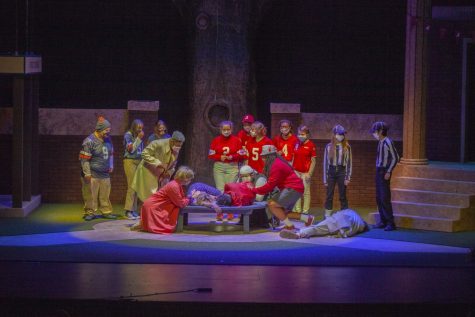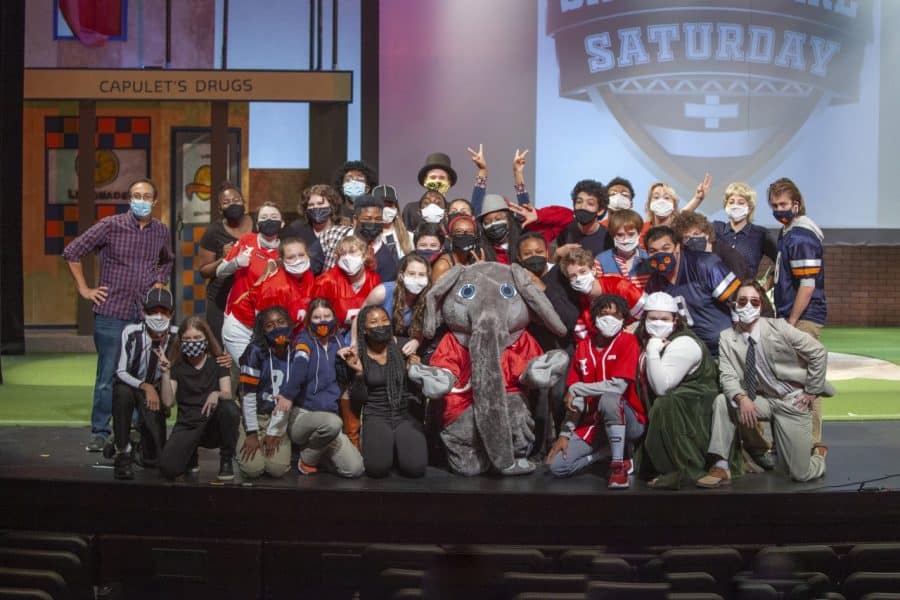Romeo and Juliet, but make it the Iron Bowl
October 24, 2021

Modernizations of Shakespeare’s classic “Romeo and Juliet” have graced both the screen and the stage, but none capture the essence of Alabama quite like the Alabama School of the Fine Arts’ production of “Romeo and Juliet: Iron Bowl Edition.”
The adaptation is a cultural phenomenon, something that could only exist in the state of Alabama. No other SEC rivalry inspires animosity and passion quite like Auburn and Alabama, or “two households, both alike in dignity.”
The phrase “Romeo and Juliet: Iron Bowl Edition” inspires confusion and a mild sense of dread.
Alabama School of Fine Arts seniors Bradley Seals and Remy Pouyadou, who played Romeo and Juliet, admitted that they were apprehensive about the concept at first, but the resulting production proved to be entertaining and aware of its inherent humor.
This adaptation is set in modern-day Alabama with slightly modified Shakespearean language. No longer do House Capulet and House Montague exist; they are now the House of Crimson Tide and the House of War Eagle.
For audience members, the mix of Shakespearean and modern language can be jarring at times, especially in the balcony scene.
“Art thou not Romeo, and a Crimson Tide,” lamented Juliet from the balcony of Capulet’s Drugs, a nod to the famous Toomer’s Drugs near Auburn’s campus.
To express the division of the two houses, crimson, white, orange and blue were incorporated in the costumes and the set. Romeo and Juliet often wore more muted versions of their colors to visually tie them together, while other characters were obviously Tigers or Crimson Tide fans.
Grafting college football clashes over a classic story of a long-standing and bloody family feud is difficult to describe as anything other than utterly ridiculous. Perhaps the most ridiculous part, then, is how well it worked.
“The play’s about rivalry. … And so, we thought, how would we get an audience to understand something like generational rivalry,” said John Manzelli, the theater arts chair at the Alabama School of Fine Arts and director of “Romeo and Juliet: Iron Bowl Edition.”
Although the purple shirt he sported on the night of the play allowed him to conceal this fact, he is an admitted Alabama fan. Throughout the play, the connection to the modern world is clearly visible. Anyone who faintly remembers “Romeo and Juliet” from their ninth-grade English class might recall the early scene where a young Capulet man picks a fight with Montague’s servants over the gesture of biting his thumb. Manzelli switches this scene around so that the Montagues are the instigators, but more noticeably, he changes the thumb bite to a hearty “Roll Tide.”
Every year, English teachers must explain why biting one’s thumb was offensive in Shakespeare’s time. No one in the audience that night needed an explanation for why “Roll Tide” might incite a brawl.
The campiness doesn’t stop there. The first half of the play is littered with over-the-top physical comedy, breaking of the proverbial “fourth wall,” and in some cases, overtly sexual jokes or references. All of these things were features of the original production, though many of them have been lost in translation to the common reader.
Seals, the play’s Romeo and an Alabama fan, said the intense football rivalries that exist in the real world make this interpretation land.
“You have something that equates to that passion that they have,” he said.
He argued that the metaphor works because it draws on the logical extreme of a real phenomenon.
The quirky tilt on a classic story also brings the strangeness of the original into startling focus. It’s insane to imagine that two teenagers would fall in love over the course of just a few days, let alone die as a result, and Manzelli’s adaptation points to the fact that such a bitter sports rivalry as the Iron Bowl is hardly more sensible.
As the play transitions from its first to second half, the silliness drops off sharply. The Alabama-Auburn rivalry becomes an element of the background, evident more in the unchanged costuming and set design than in the dialogue or plot.
Even this faithfully conveys the jarring shift from comedy to tragedy that Shakespeare wrote into the original. There’s an element of ridiculousness in the lack thereof, as viewers watch the goofy teenagers they’ve come to know turn from lighthearted humor to violence, despair and finally suicide.
This sudden pivot in mood had the potential to pull the audience out from the carefully constructed balance of silliness and seriousness, but strangely enough, it didn’t.
The key to this was the authenticity of the characters. Both Seals and Pouyadou, who confessed her family’s allegiance to Auburn, said this was one of their favorite parts of the play.
“I did not realize how close I was to Friar Lawrence until we got to that tomb scene and Friar was bawling,” Seals said. “It’s interesting to find friendships in the play.”
Pouyadou agreed that Juilet’s friendships in the play were “beautiful” relationships to play.
It’s these personal elements in the midst of an absurdist satire of both classic literature and sports fandom that allow the piece to make a larger point about human nature. “Romeo and Juliet,” however it is presented, is about the spectrum of teenage passion, ranging from careless fun to existential anguish.
Whether the topic of discussion is star-crossed young lovers in a Shakespearean tragedy or college football fans cultivating hatred for the color of a jersey, Manzelli put it best when he said, “Ultimately, they’re just kids.”
Questions? Email the Culture desk at culture@thecrimsonwhite.com.
















![UPDATE | New details have emerged about U.S. Immigration and Customs Enforcement’s arrest of doctoral student Alireza Doroudi.
— Yesterday, a University spokesperson confirmed that a doctoral student was arrested by federal immigration authorities, without providing the student’s name, declining to share specific information due to federal privacy laws.
“International students studying at the University are valued members of the campus community, and International Student and Scholar Services is available to assist international students who have questions,” said Alex House, associate director of media relations for the University. “UA has and will continue to follow all immigration laws and cooperate with federal authorities.”
— An employee at the Pickens County Jail confirmed that Doroudi is being held there, adding that the facility typically sends ICE detainees to a detention facility in Louisiana.
— The Department of Homeland Security provided a statement about Doroudi’s arrest:
“ICE HSI [Homeland Security Investigations] made this arrest in accordance with the State Department’s revocation of Doroudi’s student visa. This individual posed significant national security concerns,” a DHS spokesperson said. The statement did not provide details about why it claimed Doroudi posed national security concerns.
— Students for Justice in Palestine at UA, formerly known as Bama Students for Palestine, said in a statement on social media Thursday that it was “outraged” to learn of his detainment and that he "was not involved, nor has he ever been involved in any organizing or protests related to our organization."
This is a developing story and will continue to be updated. Read the updates at the link in our bio.](https://scontent-iad3-1.cdninstagram.com/v/t51.75761-15/486944895_18492822301025566_6944596333023050206_n.jpg?stp=dst-jpg_e35_tt6&_nc_cat=107&ccb=1-7&_nc_sid=18de74&_nc_ohc=hnp26Pzwsm0Q7kNvgH09W0S&_nc_oc=AdmIBEMuR_aRgaBd00Hlot3E59Vj_4lQyCImLLgp8CLdbxpSmLU25dhU_MO_Zul-qcU&_nc_zt=23&_nc_ht=scontent-iad3-1.cdninstagram.com&edm=AM6HXa8EAAAA&_nc_gid=0Z3lW2dLYIDuPijm7xZPGg&oh=00_AYFVBNWcVsFCq0Pq2oujm3y5rKzC4Jvd2KHcBo4ztrbYBQ&oe=67EFF830)




